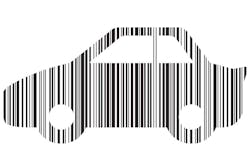Overcoming Insurance Objections on Vehicle Scans
You’ve no doubt heard and read a lot about new vehicle technologies, specifically as collision shop operators performing pre- and post-repair scans as well as the appropriate calibrations and other factory recommended steps.
I continue to hear that message at industry events and to read it within industry publications, including this one. We see more factory information offering more clarity on the topic, as evidenced by a recent Fiat Chrysler Automobiles (FCA) bulletin clearly acknowledging the need for scans, checking for diagnostic trouble codes (DTCs) in many circumstances including after any collision, even if it appears minor.
WANT TO MEET
DARRELL AMBERSON?
He’s the keynote at the FenderBender Management Conference Sept. 19–21 in Chicago and will be available for questions and discussion.
The message grows stronger and I personally confidently believe we as repairers should be following these manufacturers guidelines. It only makes sense in the interest of putting the vehicle back in a pre-loss state, for the safety and protection of the vehicle owner and occupants, and to protect our own businesses from consequences arising from negligence issues.
I very well understand that these additional steps in the repair process can drive up average repair costs. We know how competitive insurers are, as evidenced by their high profile marketing of lower premiums than competitors. I also understand how our industry is often slow to embrace new repair methodology and even slower at establishing typical pricing and compensation.
I’ve been at industry events where some upper-level insurance people express their willingness to embrace new technologies and discuss the financial implications. Yet, at the grassroots level I have been amazed, at times amused, by the reaction of some insurance representatives to this issue. It’s a worthwhile endeavor to discuss some of these responses so that we as repairers can best react with professionalism and knowledge. In many cases the responsibility to educate insurers can fall on the shoulders of us as repairers.
I’ll give you some examples:
“You don’t have to scan if there is no dash light on.” This is simply false on newer vehicles. There are seemingly almost countless DTCs that will not trigger a dash light.
“I spoke to someone at the dealership and they said ...” Dealerships have access to factory information and training. It doesn’t necessarily mean that they’ve absorbed it or understand it. Most dealerships don’t have body shops and are rarely confronted with our issues.
I’ve heard this expression used with conclusions in direct conflict with factory repair information. I’ve seen examples of an insurance representative talking to a specific dealership mechanic then making their own local policy based on it. I’ve worked with many talented dealership mechanics, but I know from experience there are those who can have misunderstandings and be mistaken. The manufacturers set the standard, not the dealership. When seeking professional, precise repair information, refer to what the manufacturer says. I-CAR constantly references and makes repair recommendations based on factory repair information.
“There was no one sitting in the RF seat during the loss, therefore the seat sensor doesn’t require calibration.” This is when referencing a model such as a Honda or Toyota that specifically falls under the factory directive to calibrate after any collision and is also just wrong. The prescribed calibration is to be performed whether someone is in the seat or not.
“The vehicle has some prior unrelated damage that should have required a seat calibration; therefore we will not pay for one from this new loss.” One example I am aware of with this insurer response was over a vehicle with three door dings. Of course one wonders if this is just a weak excuse to avoid paying for the calibration. I will let you be the judge. Regardless, I would not recommend avoiding the issue because an insurer won’t pay for it. At the very least I recommend that you inform the customer and document the situation. Many of us as repairers would do our best to negotiate payment from the insurer, then perform the calibration whether we were paid for it or not to avoid any risk of negligence.
“Your ALLDATA documentation is not adequate to support your request for payment for this operation. I need to see documentation from the manufacturer instead before I will pay for it.” Of course the ALLDATA system is made up of factory repair information, as described on the company’s website. (Do they really think ALLDATA just makes it up?) You can overcome this argument by educating the insurer on ALLDATA or by obtaining the factory documents.
“There must be some exceptions where we don’t have to calibrate the seat after a collision.” I understand the logic behind not performing the calibration after a door ding from a shopping cart. Yet the factory information clearly says ALL collisions. Use your best judgement.
Recently I’ve seen wording at the end of one large insurer’s estimates referencing an NHTSA safety related recall of some Toyotas that have been modified to include accessories such as seat covers or seat heaters and describes that they “may not have had the passenger seat occupant sensing calibration tested.” It goes on to describe the safety concerns. The insurance rep used this statement on the estimate to refuse payment for the seat sensor calibration on a current loss, implying that instead it should be done as part of the recall. Again, one wonders about the implications in this situation in terms of it being reasonable logic to deny payment and what the risks for the shop are by not performing the calibration.
As you can see from these examples, some insurers are going to great lengths to provide reasons to deny payment for scans and calibrations. As much as I may understand the frustration over poor logic, ignorance and potential negligence, it is up to us as repairers to control the end result of our work.
Educating insurers and customers can often be our responsibility, especially if we are serious about creating a positive end result for our consumers as well as the health of our long-term insurance relationships. Patience and understanding are a virtue. Persistence typically wins the day.
About the Author

Darrell Amberson
Darrell Amberson is the president of operations at LaMettry’s Collision in the Twin Cities and a highly engaged, longtime industry volunteer and advocate. Reach him at [email protected].
